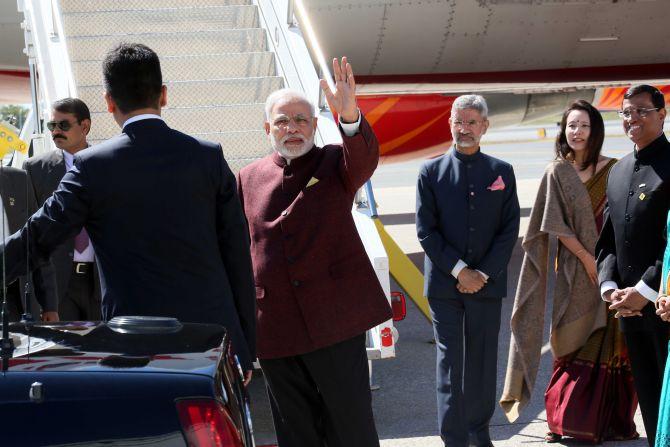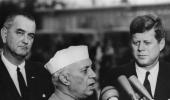 'Relations between India and America will always be transactional. It is true that the two countries share common values -- democracy, rule of law, separation of powers, etc, but these have failed to establish a long range, lasting and compatible relationship,' says Ambassador C R Gharekhan.
'Relations between India and America will always be transactional. It is true that the two countries share common values -- democracy, rule of law, separation of powers, etc, but these have failed to establish a long range, lasting and compatible relationship,' says Ambassador C R Gharekhan.
A great deal of hype has been generated around Prime Minister Narendra Modi's visit to the United States, and rightly so. Given the background of relations between Modi and United States, particularly the denial of a visa to him over the years, the visit has acquired a kind of vindication for the prime minister.
The Indian-American community has gone into overdrive to ensure not only that Modi gets an unprecedented reception not only from them, but also from official Washington. They have over the years acquired enough clout to demand and obtain privileges for the special visitor from India, though an address to the joint session of the US Congress is not one of them, for reasons beyond their control.
During this writer's stay in New York for 14 years in the 1980s and 1990s, it was evident that the Overseas Friends of BJP were more numerous than the overseas friends of the Congress party.
Relations between India and America will always be transactional. It is true that the two countries share common values -- democracy, rule of law, separation of powers, etc, but these have failed to establish a long range, lasting and compatible relationship.
The US has consistently supported authoritarian regimes everywhere, including in our neighbourhood, in preference to democratic governments. There are examples galore of this behaviour. This has only demonstrated the validity of the dictum that the only abiding principle in international relations is the principle of national interest. In other words, it is essential not to have any illusions while dealing with other governments.
On balance, it is clear that Modi is in a position to offer more to US President Barack Obama than the latter to the former. Obama wants to sell extremely expensive defence equipment to us; the US economy depends a lot on the state of its defence industries.
We shall have to be very demanding while negotiating clauses regarding transfer of technology, going into great details. Quite often, transfer of technology is not what it ought to be.
He wants India to be 'cooperative' in the World Trade Organisation, in particular the Trade Facilitation Agreement. We have our own concerns regarding food security. In general, in commercial matters, hard bargaining must be resorted to; political considerations should not affect commercial decisions.
Obama needs Modi's support for his 'war on the Islamic State' even more than on WTO at this stage. He has staked his prestige and that of his country on this issue. He claims to have lined up nearly 50 countries in his coalition; the inclusion of India will be a huge plus for him. Modi should give whole hearted support to the war on extremism and terrorism.
This menace of Islamic State is a threat to India also and we should give full political and moral support to Obama who has shown that, whether one likes it or not, the US remains the indispensible power on such matters. If in the process of expressing unqualified support to the war on extremism we can earn Obama's 'thank you', there should be no harm in that.
But there is one caveat. We must not agree to any formulation that can be interpreted as endorsing the attacks on Syrian territory. India does not share the West's agenda of regime change in Damascus, which is what lies behind the campaign against Syria. Of course, there can be no question of sending any 'boots on the ground.' All experts agree that without contribution of combat troops from outside, the Islamic State can be degraded but cannot be destroyed. Thus, our support should be clear, but qualified at the same time.
There is one more subject to which Obama attaches great importance and that is the war on the Ebola pandemic. On this, our support should be strong and unqualified. The rapidity with which Ebola has spread in Africa and given the traffic between India and Africa, we have huge stake in combating the disease.
The World Health Organisation estimates that $1 billion (about Rs 6,000 crorw) is required for this campaign. Modi should without hesitation pledge $100 million (about Rs 600 crore). This will be hugely appreciated not only by Obama, but also by our friends in Africa.
Judging by Modi's style in dealing with foreign leaders so far, it seems that he has developed or instinctively has a style that is at once candid as well as non-offensive and non-offending. He will no doubt engage Obama and other leaders in New York in the same fashion as while talking to them about Pakistan, Sri Lanka, Myanmar, China and other neighbours.
On Pakistan, he would want to explain why we had to cancel the secretary level talks, a decision that did not go down too well in some Western countries, going by their media.
Image: Prime Minister Narendra Modi arrives in New York. Also in the photograph: India's Ambassador to the US Dr S Jaishankar, his wife Kyoko Jaishankar and Ambassador Dyaneshwar Mulay, India's consul general in New York. Photograph: Mohammad Jaffer/Snaps India
Ambassador C R Gharekhan is India's longest serving representative to the United Nations and author of The Horseshoe Table.










